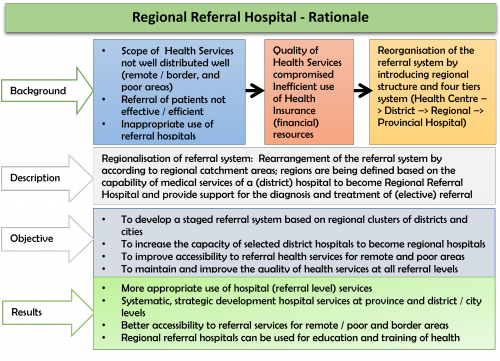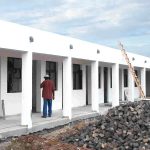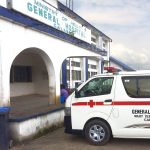Date
10/2014 – 12/2014
Country
Indonesia
Client
KfW
Financing Institution
Ministry of Foreign Affairs
Consortium Partner
Saniplan
m4h Key Areas
Health Services
Project Description
Following the giant Tsunami in December 2004, which had hit the Province of Aceh, a huge investment programme was launched by the Indonesian Government supported by many Countries including the German Development Bank (KfW). In the health sector this investment was focused on basic health services and the reconstruction of the the Zainoel Abidin Hospital in Banda Aceh.
The long travel distances from the eastern and central mountainous parts of the province and the lack of human and financial resources necessitated the need to further support the health care and referral system and to assure equity in access to quality health care services for the population of the whole province.
The challenge in these regions in ensuring a continuum of care from the primary level (village) to Puskesmas (Health Centres), to District Hospitals and to Referral Hospitals is primarily the geographic obstacle, followed by the community reluctance to be referred due to the perceived or real impressions of the referral facility quality. The scope of health services is not well distributed between remote and poor areas and at all levels of care there is a compromised quality of health service with inadequate standardisation of care.
Therefore the Indonesian Government decided to cooperate with the German KfW Development Bank in the framework of a “promotional” loan programme called the “Aceh Hospital and Community Health Centre Project” where a total volume of at least 119.46 million USD will be invested in the improvement of health care services at provincial level.
The Aceh Provincial Government has developed an extended programme proposal aiming at the “Reengineering and Improving of the Hospital and Referral Systems in Selected Districts of the Aceh Province”.
Scope of Work
The concept of regionalisation of the referral system is based on rearranging patient flows according to regional clusters (geographically defined catchment areas of district hospitals) and enabling selected district hospitals to become Regional Referral Hospitals which is expected to improve accessibility of health services in all districts of the province, especially in remote, mountainous, and often poor areas.
As referral services should not only be geographically but also financially accessible (affordable) and be able to provide acceptable quality of care, “The Aceh Hospital and Community Health Center Project” also aims at human resources development for medical and associated staff and the strengthening of universal health coverage through the existing social insurance scheme for all people living in Aceh (JKRA – Jaminan Kesehatan Rakyat Aceh).
To ensure that quality health care is provided at each level of care and to optimise the capacity of the service facilities at each level, the following activities will be carried out by the project.
- Rehabilitation / modernisation, extension / new construction, and equipment of selected hospitals (at provincial, regional, and district level),
- Construction and equipment of health centres (Puskesmas), sub-health centres (Pustus) and village health clinics;
- Improved quality of care and resource management through measures supporting integrated systems development (training, coaching, technical assistance).
A feasibility study conducted in Aceh will inform the implementation of an effective referral system strengthening in Indonesia. Saniplan together with m4h had been engaged to conduct the feasibility study and to assess the functionality of the health referral system by conducting the following activities and exploring the following areas:
- assess current needs for health services and of the existing capabilities of the provincial health system and health facility network to meet those needs;
- analyse and evaluate the existing health infrastructure (buildings and equipment);
- describe the current referral patterns and processes and evaluate their performance;
- identify investment measures required to upgrade the existing infrastructure: civil works for construction and rehabilitation, procurement of medical and non-medical equipment;
- propose support measures for capacity building to improve the referral system, service quality, facility management, as well as hospital hygiene and waste management;
- estimate quantities and costs for all project activities; and
- establish an implementation schedule and M&E Plans




